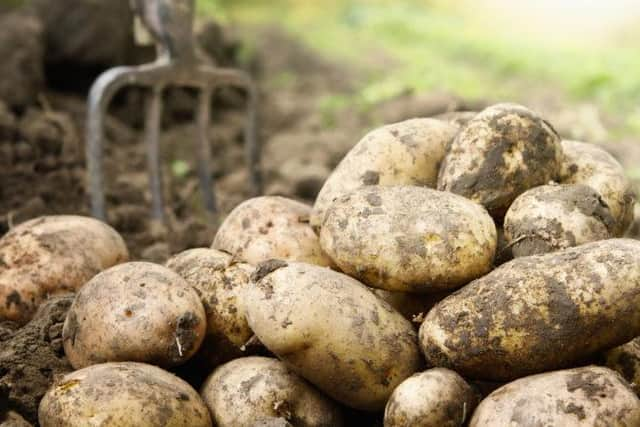Has the SNP found a way to work with Brexit for the good of all? - Brian Monteith
Scottish seed potato farmers are one of the biggest exporters for the production of potato chips and crisps in the world, with the sector accounting for three-quarters of UK production and worth more than £200 million a year.
Thanks to our cool and damp climate, and not a little perspiration and knowledge, our seed potatoes are less prone to viruses, aphid infestation and the notifiable bacterial diseases Brown Rot and Ring Rot – all of which can be problems on the European continent.


Advertisement
Hide AdAdvertisement
Hide AdAs explained on Facts4EU.org, due to the EU’s strategy of demonstrating to member states that any country seeking to leave the EU like the UK did will only suffer pain, it refused to include a section allowing mutual equivalence of seed potato standards in its ironically named Trade & Cooperation Agreement (T&CA).
The result was that from January 1 last year the sale of all British seed potatoes to the EU was banned. Further, thanks to the Northern Ireland Protocol putting a trade border in the Irish Sea, the ban also applied to British seed potato sales to Northern Ireland – in direct contradiction of the 1800 Acts of Union allowing equal trade across the UK.
There is no dubiety – in the case of seed potatoes the UK Government sought to agree a deal on equivalence of standards with the EU – but it was the EU that turned this down.
Strangely, the EU has granted the UK equivalence status for the supply of seeds for fodder crop, beet, cereal, and oilseed – but not seed potatoes. Why those in particular, when UK seed potatoes are the world gold standard and superior to the standards pertaining in the EU?
Could it have been to divide and rule within the UK by giving the SNP a cause over economic damage from Brexit to make their own?
The EU’s mendacity is obvious, it was seeking to bully the UK to concede to ‘dynamic alignment’ of standards, which would mean the UK accepting EU laws whenever they change, such as its appalling decision last year to allow animal remains to be fed to livestock.
European Commission vice-president Maroš Šefčovič is holding out for dynamic alignment from UK foreign secretary Liz Truss even now.
The EU’s position is absurd. Some 60 per cent of seed potatoes used by Irish farmers would normally come from Scotland – now they cannot buy them and are worried about importing EU seed potatoes because of the risk of importing disease to the Irish potato crop.
Advertisement
Hide AdAdvertisement
Hide AdLikewise, EU farmers cannot obtain British seed potatoes and will likely see a deterioration in their own potato crop.
In contrast, for the first six months of the T&CA’s operation, the UK continued to allow the importation of EU seed potatoes in an attempt to encourage the EU to reciprocate. When it did not, the UK then banned the EU’s varieties of seed potatoes.
Unlike the EU, Egypt – the UK’s largest export market for seed potatoes – signed-off a continuity agreement to ensure continued British supplies after we left the EU. It was that simple – no membership fee, no political commitments or EU oversight, just a mutually beneficial deal.
It is not often I applaud Scottish Nationalist politicians, and with good reason. Too often, if not practically all the time, I find their focus is to grandstand on imagined grievances where Westminster, London or England can be blamed for some problem being faced in Scotland.
This pre-occupation is prioritised ahead of demonstrating creativity or competence to resolve Scotland’s challenges using the significant powers that Holyrood has in its legal and fiduciary armoury.
When, however, the SNP MPs for Stirling, Gordon and Angus wrote jointly to the UK’s Secretary of State for international trade, Anne-Marie Trevelyan, and Mr Šefčovič last week, urging them to find a settlement that will end the EU’s ban on UK seed potatoes, they did so without making the usual and entirely pointless attacks on the UK Government, or the usual carping about Brexit – so I must commend them for their tone.
Were Scottish politics conducted more often with the aim of seeking to achieve a positive outcome by leaving the petty point-scoring at home, I have no doubt we would have far better public services, greater prosperity and prospects – and a far more harmonious and less divided society.
I could be wrong, of course, about the three SNP MPs. A more suspicious cynic might just wonder if they know something of what the EU is offering Ms Truss in the negotiations over changes to the Protocol.
Advertisement
Hide AdAdvertisement
Hide AdBeing a former MEP, Stirling’s MP Alyn Smith might possibly have an inside track to the commission. Maybe Mr Šefčovič has offered to lift the seed potato ban in return for Ms Truss withdrawing her demands.
If she were to reject such an offer, the SNP could present itself on the moderate and pragmatic side of the two belligerents and have a new grievance to nurse and grandstand over. If she were to accept they would expect to be in the vanguard of taking credit for Mr Šefčovič’s concession being obtained. It’s not as if Tory MSPs or backbenchers are protesting about the malign influences of the Protocol and how it damages Scottish trade to Northern Ireland.
In the spirit of apparent political harmony, I call upon Mr Šefčovič to listen to the request of the UK Government, supported by the SNP MPs, for mutually recognised standards for seed potatoes, otherwise French fries in France will never be the same again.
- Brian Monteith is a director of Global Britain and a former member of the Scottish and European Parliaments.
Comments
Want to join the conversation? Please or to comment on this article.
